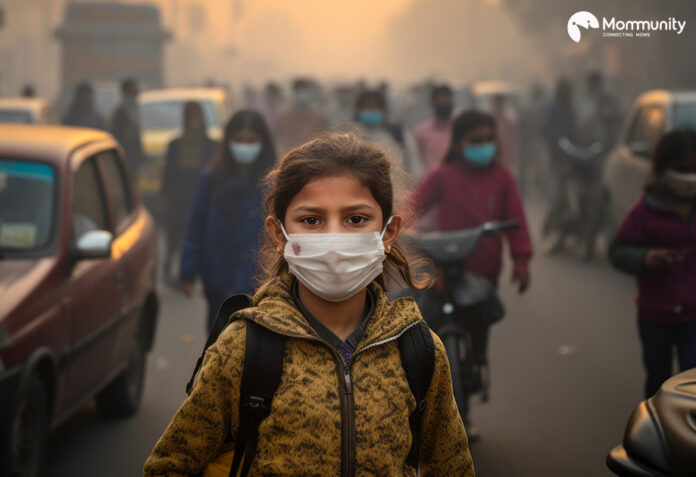Burned eyes, less oxygen, breathing issues, unclear vision, etc are all the things you are feeling right now, isn’t it? Do you know the reason? It’s because of poor air quality. Can you imagine if it causes this much damage to an adult how dangerous it is for a kid? It’s important to take all the safety precautions for your little one to survive in this air.
In this blog, we will discuss practical safety precautions to enable you to reduce the health risks caused by indoor pollution and to make sure your child’s well-being is not at stake. So let’s dive into the blog.
Understanding Poor Air Quality and Its Effects on Kids
Pollutants such as particulate matter (PM2.5 and PM10), carbon monoxide, nitrogen dioxide, and volatile organic compounds (VOCs) are the main contributors to poor air quality. These pollutants are mainly due to tailpipe emissions, industrial activities, and the burning of fossil fuels. Air quality can quickly descend during occurrences such as wildfires or weather inversions.
4 Effects of Poor Air Quality on Children
- Respiratory Problems
Kids who inhale the polluted air are likely to develop coughs and wheezing, and they will also be more susceptible to asthma.
- Reduced Lung Function
Long-term exposure is a hurdle to the healthy development of a child’s lungs.
- Weakened Immune System
Air pollution might, due to the decreased effectiveness of the immune system, cause the body to lose its power to fight infections.
- Aggravation of Pre-existing Conditions
Chronic illnesses such as asthma and bronchitis can exacerbate the condition.
Scientific Data on Air Pollution and Children’s Health
- The journal Environmental Health Perspectives reports a study, where children who were highly exposed to PM2.5 had 18% lower lung development at the age of 18.
- From The Lancet’s views, it is stated that a 20% reduction in air pollution can lead to approximately 15% of cases of respiratory diseases decreasing among children.
9 Safety Precautions For Kids Protection
1. Monitor Air Quality Regularly
- Try trustworthy apps or websites that include AQI (Air Quality Index) trackers, which can tell you real-time information about air quality levels in your areas.
- Be wary of local air quality advisories when the weather is very bad or the fire is out in the vicinity.
Tip: If AQI is over 100, which probably means asthma, let’s make sure all protective measures for air pollution safety have been taken.
2. Keep Kids Indoors on Poor Air Quality Days
- Avoid outdoor activities, in particular, engaging in any physical exercises during bad air quality periods.
- Make an indoor play area for the kids so that they can remain active without being exposed to pollutants.
- Windows and doors should be sealed to prevent air pollution from entering your home.
3. Use Air Purifiers at Home
- Buy a good air purifier that is equipped with HEPA filters to lower indoor air pollution.
- Put the purifier in the places where your child often stays, such as his bedroom or playroom.
- Keep it clean and in good condition by regularly checking and cleaning it.
4. Avoid Outdoor Activities During Peak Pollution Hours
- These high pollution levels mainly occur early in the mornings and late in the evenings due to temperature inversions.
- Organize outdoor activities, such as sports or playing outside, during which the air quality is most frequently better.
5. Provide Proper Masks for Outdoor Use
- In case your child is outdoors, make sure that they wear a suitable mask.
- At the same time, make sure that you are using masks specifically engineered to filter the pollutants, such as N95 or KN95 masks.
- The simple regular cloth masks are not preferable because they do not perform well in filtering fine particulate matter.
6. Keep Indoor Air Clean
- Avoid activities that can increase indoor air pollution, such as smoking or burning candles.
- Utilize exhaust fans while you are cooking in the kitchen to minimize indoor air pollutants from the tasks of cooking.
- Proper ventilation is achieved through air purifiers and maintaining indoor humidity levels up to 30% and 50%.
7. Encourage a Healthy Diet
- A healthy diet can help to improve your child’s immune system and thus lessen the damaging effects of air pollution.
- Supply the diet with foods abundant in antioxidants, which are the ones in fruits and vegetables to comb out the oxidative stress due to pollutants.
- Make sure your child periodically drinks water to keep the air passages in their body in proper condition.
8. Educate Your Child About Air Quality
- Instruct your child regarding the significance of air quality and its effects on their health even as they grow up.
- Motivate them to protect themselves by wearing a mask when they are outside on bad air quality days.
- Guide them to identify the signals of coughing or shortness of breath and motivate them to inform you if they feel unwell or have these symptoms.
9. Regularly Clean and Maintain Your Home Environment
- Minimize Dust and Allergens: Vacuum carpets, rugs, and upholstery frequently with a vacuum cleaner having a HEPA filter that will help in reducing indoor dust and allergens.
- Wash Curtains and Linens: Regularly, wash curtains, bed linens, and soft furnishings to stop the dust from getting trapped.
- Use Indoor Plants Carefully: Although some plants can improve the air quality among you, do not give them too much water because this may cause mold growth.
- Control Pet Dander: In the case of pets, bathe them frequently and restrict their access to child play areas.
3 Additional Tips for Managing Poor Air Quality
1. Create a Safe Room at Home
- Choose one of your rooms to be the ”clean air room” with an air purifier, sealed windows, and minimal dust.
2. Limit Exposure to Pollutants
- Always avoid your transportation time during rush hour because vehicle emissions are the biggest contributor to pollution.
- Ride public transport or join a carpool and cut down the number of emissions released on the roads.
3. Advocate for Clean Air
- Be actively involved in the community that is fighting to reduce pollution. This can include tree planting or transitioning to cleaner energy sources.
- Give your backing to initiatives that are put in place to improve the air quality in your area through the authorities.
The Key Takeaways
They must be aware of the risks of poor air quality and take action to protect the health of their children. Yet, there is no single and efficient way to get your child through a period of poor air quality. Here are some of the measures you can take: Monitoring air quality, creating a clean indoor environment, and a diet that supports your child’s immune system could also be helpful. Regular check-ups with the doctor should also be ensured besides proper care at home.
However, the most important thing to be aware of is to keep your child protected from exposure. You can make these precautions a family habit, and your children will be fit and healthy even in harsh environmental conditions. To give people the information they need about health we need to make it easy for them to do something about it.




